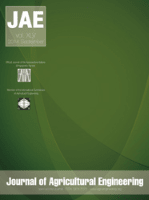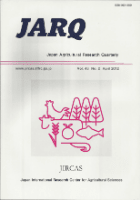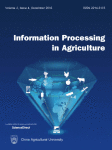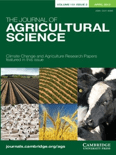
INMATEH-Agricultural Engineering
Scope & Guideline
Transforming Agricultural Practices with Cutting-Edge Research
Introduction
Aims and Scopes
- Agricultural Machinery Design and Optimization:
The journal emphasizes the design and optimization of various agricultural machines, including seeders, harvesters, and irrigation systems, to enhance efficiency and productivity in agricultural practices. - Robotics and Automation in Agriculture:
A significant focus is on the integration of robotics and automation technologies in agricultural operations, including the development of autonomous vehicles, drones, and robotic systems for tasks such as planting, monitoring, and harvesting. - Precision Agriculture Technologies:
Research on precision agriculture technologies, including IoT applications, remote sensing, and data analytics, is a core area, aimed at improving resource management and crop yield. - Sustainable Practices and Environmental Impact:
The journal explores sustainable agricultural practices, assessing the environmental impact of various agricultural technologies and promoting eco-friendly innovations. - Machine Learning and AI Applications:
There is a growing emphasis on the application of machine learning and artificial intelligence in agricultural engineering, particularly for disease detection, yield prediction, and operational optimization. - Soil and Crop Management Technologies:
Research on soil management, crop monitoring, and the development of technologies for enhancing soil health and crop performance is a key focus area.
Trending and Emerging
- Integration of AI and Machine Learning:
There is a significant increase in research applying AI and machine learning to agricultural problems, such as crop disease detection, yield prediction, and operational efficiency. - Robotics and Autonomous Systems:
The development and application of robotics in agriculture are gaining momentum, with a focus on autonomous vehicles and robotic systems for various agricultural tasks. - Sustainable and Eco-Friendly Technologies:
Emerging themes include the development of sustainable agricultural technologies that minimize environmental impact, such as bio-based materials and renewable energy applications. - Smart Irrigation and Water Management Systems:
Research on smart irrigation technologies, including IoT-enabled systems for real-time monitoring and control, is trending due to increasing concerns over water scarcity. - Data-Driven Decision Making in Agriculture:
The use of data analytics and big data in agriculture for making informed decisions is becoming increasingly relevant, driving research in this area. - Soil Health and Nutrient Management Innovations:
There is a growing interest in innovative approaches to soil health and nutrient management, including precision fertilization and soil amendment technologies.
Declining or Waning
- Traditional Agricultural Practices:
There is a noticeable decline in research focused on traditional agricultural practices, as the field shifts towards more innovative, technology-driven approaches. - Basic Agricultural Research without Technological Integration:
Research that does not integrate advanced technologies or engineering principles, focusing instead on basic agricultural studies, is becoming less prominent in recent issues. - Conventional Soil Management Techniques:
Studies on conventional soil management techniques are witnessing a decrease in frequency, as the focus shifts toward precision agriculture and advanced soil health technologies. - Non-Automated Crop Management Systems:
The exploration of non-automated systems for crop management is declining, reflecting a broader trend towards automation and smart agricultural practices.
Similar Journals

Romanian Agricultural Research
Nurturing Innovations in Agronomy and Crop ScienceRomanian Agricultural Research is a prominent academic journal dedicated to advancing the field of agricultural science with a specific focus on agronomy and crop management. Published by the NATL AGRICULTURAL RESEARCH & DEVELOPMENT INST in Romania, this journal has established itself as an important resource within its discipline, evidenced by its Q3 ranking in the Agronomy and Crop Science category for 2023. With its ongoing publication since 2008, the journal provides a platform for researchers and professionals to disseminate their findings and share innovative practices that address the challenges faced in agricultural development. Although it operates under a non-open access model, Romanian Agricultural Research commits to rigorous peer-review processes, ensuring the high-quality content that enhances the academic community’s knowledge base. The journal's objective is to foster dialogues surrounding sustainable agriculture, improve crop yield, and contribute to the enhancement of agricultural practices globally. Researchers, professionals, and students will find this journal to be an invaluable repository of knowledge and a catalyst for future agricultural innovations.

AMA-Agricultural Mechanization in Asia Africa and Latin America
Pioneering Research for a Sustainable Agricultural FutureAMA-Agricultural Mechanization in Asia Africa and Latin America is an esteemed journal published by the FARM MACHINERY INDUSTRIAL RESEARCH CORP, dedicated to advancing the field of agricultural mechanization. With a history spanning from 1982 to 2020, this journal has served as a pivotal platform for disseminating innovative research and insights related to agricultural practices and technologies across pivotal regions including Asia, Africa, and Latin America. Although the journal has ceased its coverage in Scopus, its contributions to the fields of Engineering and Agricultural and Biological Sciences remain significant, particularly for professionals and researchers focusing on agricultural engineering dynamics. While it operates under a traditional subscription model, the urgency of its content in mechanization solutions continues to aid in enhancing agricultural productivity and sustainability. Researchers and practitioners alike will find invaluable resources within its pages, reflecting the critical developments in the sector during the late 20th and early 21st centuries.

Journal of Agricultural Engineering
Empowering Researchers to Transform Agricultural PracticesThe Journal of Agricultural Engineering, published by PAGEPRESS PUBL, is a vital resource for researchers, professionals, and students engaged in the fields of agricultural technology and engineering. With an ISSN of 1974-7071 and an E-ISSN of 2239-6268, this Open Access journal has been disseminating valuable research since 2007, making significant strides in the accessibility of research findings. Based in Italy, the journal aims to bridge the gap between theoretical approaches and practical applications in agricultural engineering, focusing on innovative solutions to contemporary challenges in the sector. The journal has achieved respectable Scopus rankings, including #192/384 in Industrial and Manufacturing Engineering, highlighting its relevance and contribution to the field despite its Q4 and Q3 quartile rankings in related categories. The convergence of knowledge from 2012 to 2024 captures an evolving perspective on agricultural engineering practices, enhancing its appeal for those striving to advance the discipline. As an open-access platform, the journal ensures that cutting-edge research is readily available, fostering collaboration and knowledge sharing in a rapidly changing world.

JARQ-JAPAN AGRICULTURAL RESEARCH QUARTERLY
Exploring the Frontiers of Agronomy and EcologyJARQ - Japan Agricultural Research Quarterly serves as a pivotal platform in the field of agricultural sciences, published by the esteemed Japan International Research Center for Agricultural Sciences. Established in 1973, this journal has a rich history and plays a critical role in disseminating significant research findings relevant to agronomy, crop science, animal science, ecology, and biotechnology. Despite its ranking in the lower quartiles, with impressive coverage from 1973 to 2024, it continues to attract contributions that enhance agricultural strategies and practices in Japan and beyond. The journal facilitates discussions that are essential for fostering innovation in agricultural methodologies and environmental sustainability. Accessible to a diverse audience, including researchers, academics, and practitioners, JARQ emphasizes the importance of advancing agricultural research and its implications for food security and ecological balance.

Agricultural & Environmental Letters
Exploring the intersection of agriculture and environmental stewardship.Agricultural & Environmental Letters, published by WILEY, is an esteemed open-access journal dedicated to advancing knowledge in the fields of agronomy, environmental science, and soil science. Since its inception in 2016, the journal has provided a vital platform for researchers, professionals, and students to contribute to critical discussions on sustainable agricultural practices and environmental management. With an impressive 2023 impact factor placed in the Q2 category across various fields—namely Agronomy and Crop Science, Management, Monitoring, Policy and Law, and Soil Science—this journal occupies a significant position in academic discourse. The journal’s Scopus rankings further attest to its influential role; it ranks in the top half of its categories, reflecting the quality and relevance of the research published within. Agricultural & Environmental Letters welcomes innovative research articles, reviews, and empirical studies focusing on pressing environmental and agricultural issues, ensuring accessibility for a global audience committed to sustainability in agriculture and environmental stewardship.

Revista Ciencia Agronomica
Transforming research into real-world agricultural solutions.Revista Ciencia Agronomica is a leading open access journal published by the Universidade Federal do Ceará, Departamento de Geociências, dedicated to advancing the field of agricultural sciences. Established in 2008, the journal has emerged as a significant platform for the dissemination of original research and innovative advancements in areas including agronomy, horticulture, and soil science, with a dedicated convergence of years extending to 2025. With an impactful presence in academic circles—ranking in Q3 for Agronomy and Crop Science and Soil Science and Q2 for Horticulture in 2023—this journal provides vital insights for researchers and practitioners alike. Although specific HIndex metrics are currently unavailable, the journal's Scopus rankings attest to its relevance, placing it in the 52nd, 44th, and 43rd percentiles across multiple pertinent categories. Since transitioning to an open access model in 2010, Revista Ciencia Agronomica has committed to maximizing the reach and impact of its published work, thereby ensuring valuable contributions to global agricultural knowledge.

Artificial Intelligence in Agriculture
Empowering Agricultural Progress with Cutting-Edge AIArtificial Intelligence in Agriculture is a premier open-access journal dedicated to advancing the application of artificial intelligence technologies in the agricultural sector. Published by KEAI Publishing Ltd in China, this journal has rapidly gained recognition since its inception in 2019, boasting an impressive impact factor highlighted by its Q1 rankings across multiple categories in the 2023 Scopus metrics. Aimed at researchers, practitioners, and students alike, it provides a vital platform for disseminating innovative research and practical applications that bridge the gap between AI and agriculture. With a focus on enhancing productivity through cutting-edge AI methodologies, the journal encourages submissions that address the multifaceted challenges in agricultural practices. Whether you are looking to publish your work or explore the latest findings, Artificial Intelligence in Agriculture is an essential resource for anyone committed to fostering sustainable agricultural advancements through technology.

Information Processing in Agriculture
Cultivating Knowledge: Bridging Agriculture and TechnologyInformation Processing in Agriculture, published by Elsevier, stands at the forefront of interdisciplinary research merging agriculture with cutting-edge computational techniques. With an impressive impact factor derived from its classification within the Q1 quartile across five critical categories—including Agronomy, Animal Science, Aquatic Science, Computer Science Applications, and Forestry—this journal exemplifies excellence in scholarly communication. Open Access since 2014, Information Processing in Agriculture not only democratizes access to pioneering research but also accelerates innovation by breaking barriers for researchers, professionals, and students alike. The journal's comprehensive scope facilitates crucial dialogue on the implications of processing technologies in farming practices, contributing significantly to advancements in sustainability and efficiency within the global agricultural sector. As it converges topics from 2014 to 2024, scholars are invited to explore and contribute to a robust platform dedicated to enhancing food security and environmental stewardship.

Revista Brasileira de Ciencias Agrarias-Agraria
Connecting researchers to cultivate a thriving agricultural community.Revista Brasileira de Ciencias Agrarias-Agraria is an esteemed academic journal published by the Universidade Federal Rural de Pernambuco, dedicated to advancing the field of agricultural and biological sciences. With a focus on disseminating high-quality research, this journal plays a pivotal role in fostering knowledge exchange within the agricultural community, particularly in Brazil and beyond. As a Q3 ranked publication in the Agricultural and Biological Sciences category, Revista Brasileira de Ciencias Agrarias-Agraria contributes to the growing body of literature by featuring insightful articles from both emerging and established researchers in the field. The journal has been consistently published since 2011 and is committed to open access principles, ensuring that research findings are accessible to a wide audience. Researchers, professionals, and students will find this journal an invaluable resource for deepening their understanding of current trends and innovations in agriculture.

JOURNAL OF AGRICULTURAL SCIENCE
Transforming Agriculture with Cutting-Edge ResearchJOURNAL OF AGRICULTURAL SCIENCE, published by Cambridge University Press, stands as a pivotal resource in the field of agricultural research. With a rich history dating back to 1905, this esteemed journal has consistently delivered cutting-edge scholarly articles that address pressing issues in agronomy, crop science, animal science, and genetics. Currently holding a Q2 ranking in Agronomy and Crop Science and Animal Science and Zoology, and a Q3 in Genetics, it reflects a robust impact within the academic community, contributing to innovative practices and technologies in agriculture. Indexed in Scopus, its authors benefit from broad visibility, supported by a strong readership among researchers, professionals, and students alike. While the journal does not currently offer open access, its rigorous peer-review process ensures that published works meet the highest scholarly standards, fostering a rich environment for knowledge exchange and advancement in agricultural science.